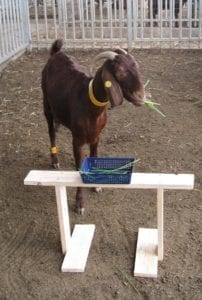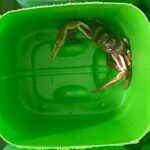Humans aren’t the only animals to recoil from a bug on our plate—a new study shows that goats will not only actively avoid eating worms on their leaves but also develop new feeding behaviours in response to different kinds of insects on their food.
“Until recently, very little was known about the prevalence and ecological consequences of the direct interactions between ungulates and insect herbivores,” said Tali Berman, one of the authors of a new study published in the Canadian Journal of Zoology. “Our discovery that ungulates possess highly efficient behavioural and sensory mechanisms to accurately detect and avoid the ingestion of different insect species stresses the point that these interactions are prevalent and important.”

Goats will use different feeding behaviours to avoid eating insects (Photo | Tali Berman).
It was previously known that goats actively avoid eating noxious, prickly webworms, and using a behaviour called probing, goats are able to feel them out on leaves with their muzzles. If a goat picked up a caterpillar with their food, they shook it off by shaking their heads.
The researchers wondered if the goats would still demonstrate this behaviour when presented with relatively harmless, smooth silkworms. They hypothesized that the goats wouldn’t necessarily avoid the leaves with silkworms since they would be harder to detect and would not impair the goat’s health.
To test this, 15 goats were presented with plates of mulberry leaves with or without silkworms and their feeding behaviour was observed. Similar to when goats were fed prickly caterpillars, the goats began with probing the leaves for insects.
By probing, the goats were able to avoid eating most of the silkworms, leaving 73% of them behind. If the goats picked up a leaf with a silkworm, it would be shaken off.
The researchers were surprised to find that the goats adopted a new behaviour, filtering, in which the goats were able to physically block the silkworms from entering their mouth with their lips. Finally, if all else failed, ingested worms were spat out.
While Berman said that they weren’t surprised that the goats avoided eating the silkworms, they were surprised to find “that the goats were capable of adjusting their feeding behaviour to accurately detect and avoid the ingestion of a different insect species”.
The research demonstrates that the relationship between ungulates and their insect prey is more complex than previously thought. Future research could isolate the various factors that influence insect ingestion such as palatability or toxicity, as well as observing other behavioural and sensory mechanisms for detecting and avoiding insects.
Goats will use behaviours such as probing, shaking, discarding, filtering, and spitting in order to avoid feeding on insects (Video | Tali Berman).
Read the paper: Goats adjust their feeding behaviour to avoid the ingestion of different insect species in the Canadian Journal of Zoology.



